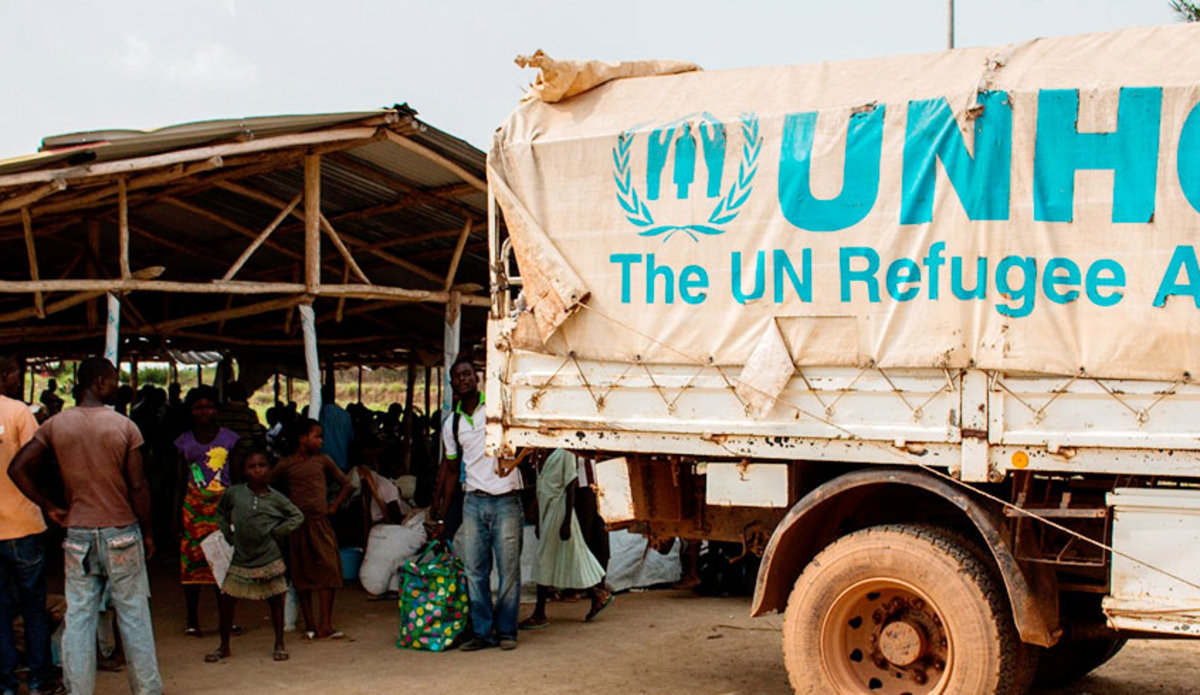Liberia, Cote d’Ivoire, UNHCR facilitate voluntary repatriation of Ivorian refugees after interruption by Ebola outbreak
Harper, Liberia, 18 December 2015 (LRRRC-UNHCR) – Today the governments of Liberia, Cote d’Ivoire and the United Nations High Commissioner for Refugees (UNHCR) resumed the voluntary repatriation of tens of thousands of Ivorian refugees from Liberia, which had been interrupted for more than a year by the deadly Ebola outbreak. Some 11,000 of the 38,000 Ivorian refugees in Liberian camps have said they wish to return immediately.
One convoy, carrying 244 people, set off from the coastal town of Harper, in eastern Liberia, for Tabou, in south-western Côte d'Ivoire, taking a ferry to cross the river border. A second convoy, carrying 401 people, left PTP camp in Grand Gedeh County for Toulepleu in south-western Côte d’Ivoire.
Cllr Abla Gadegbeku Williams, Executive Director of the Liberia Refugee Repatriation and Resettlement Commission (LRRRC) on behalf of the Liberian Government reiterated their continuous support in facilitating durable solutions for Ivorian refugees in Liberia.
Two more convoys are planned for later this month, bringing the total number of returnees by year’s end to more than 1,000 people. The convoys will pass along special humanitarian corridors because the borders currently remain closed. The returns will continue next January, with road repairs planned to improve access.
Ndeye Ndour, UNHCR Representative to Liberia, thanked the governments of both countries for enabling the return convoys to resume. “This is a very important and encouraging day that will allow the refugees on these convoys to finally return and help rebuild their country and resume normal lives in their own homes after several years in exile.”
On arrival in Tabou and Toulelpeu, the returnees will spend a day in transit centres, where they will be given a hot meal and undergo medical screening, including for Ebola. An awareness campaign aimed at reducing the risk of Ebola-related discrimination and stigmatization will be conducted in the communities where they will be returning.
Mohamed Askia Toure, UNHCR representative in Côte d'Ivoire, reiterated the agency's commitment to work with the Ivorian authorities to find durable solutions for the returnees and called on all other development and humanitarian actors to support the Government's national development programme. "It is only through collaboration that we can have a real impact in terms of promoting peace and reconciliation."
Before they are taken back to their towns or villages, the returnees will be given food rations for three months by the World Food Programme (WFP), kitchen utensils, mattresses, mosquito nets and other basic aid items by UNHCR to help them rebuild their lives.
UNHCR will help the returnees reintegrate in their homeland, with income-generation programmes, training and start-up aid. The Côte d'Ivoire government has put in place a number of programmes to help the returnees regain access to their lands and for children to get access to education.
Some 300,000 people fled the violence that followed presidential elections in November 2010 in Côte d'Ivoire, including more than 240,000 who fled to neighbouring Liberia. The crisis ended in April 2011 following a political settlement that confirmed Alassane Ouattara as president.
The voluntary repatriation of Ivorian refugees started in late 2012. While UNHCR facilitated the return of some 40,000 refugees from Liberia, an additional 160,000 are believed to have returned on their own.
The outbreak of Ebola in West Africa last year caused the closure of the land border between Côte d'Ivoire and neighbouring Liberia and Guinea, forcing UNHCR and its partners to suspend the repatriation operation in July 2014.
No Ivorian refugee in Liberia has contracted the disease and robust prevention measures have been implemented in the camps since the outbreak began in March 2014.
General peace has been long restored in Côte d’Ivoire, but sporadic attacks have taken place. On December 2 there was an attack on Ivorian military camps in the south-west, which left seven soldiers and four assailants dead. Security in the area has since been reinforced, with additional measures put in place to ensure safe passage for the convoy. Côte d'Ivoire remains largely peaceful with the government concentrating on building the economy and development.
The resumption of voluntary repatriation was agreed upon during the fifth technical meeting of the Tripartite Commission on the Voluntary Repatriation of Ivorian refugees held on 9 and 10 December 2015 in Monrovia, between the Government of Liberia, the Government of Côte d'Ivoire and UNHCR.
For more information contact:
In Liberia:
Diana Diaz Rodriguez
Associate Public Information Officer
UNHCR Liberia
+231 880846331
Edward Kemokai
Public Information Officer
LRRRC
+231 886676022
In Côte d'Ivoire:
Nora Sturm
Associate Public Information Officer
UNHCR Côte d'Ivoire
+225 06 43 07 61
Innocent Sangara
Senior Protection Officer
UNHCR Côte d’Ivoire
+225 04 01 79 57
 UN
UN United Nations Peacekeeping
United Nations Peacekeeping




